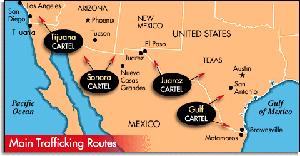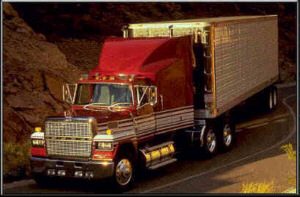The Rest of the Story: What Candidates Don't Say About Problems with NAFTA
Free Trade Expansion Could Be Even More Perilous to U.S. Jobs, Highways
March 2, 2008
By: Dave Rogers

Map shows border towns where drugs from Mexico enter the United States.

The nation's highways would be flooded by trucks from Mexico, half of which were found by an inspection to be unsafe.
You heard the candidates talking in the Presidential primary debates: "We will cancel NAFTA (North American Free Trade Act) unless the Canadian and Mexican governments agree to re-negotiate."
There's lots of vague talk about "standards," "the environment," "jobs," etc.
What you don't hear much about are the dangers from open border traffic, mainly from Mexico.
And the barriers to "fair trade" erected by both Canada and Mexico.
And the opinion of many in the trucking industry is that relaxed trading controls pending under NAFTA have the potential to eliminate truck driving jobs in the U.S., lower drivers' wages and allow Mexican drivers to flood the country with unsafe, pollution-spewing trucks.
And, even worse, that open borders will allow further increases in the drug trade and illegal alien trafficking that already are out of control.
The facts are that border states affected, Texas, California, New Mexico and Arizona, have few checks and not enough inspectors to ensure that illegals, drugs or unsafe trucks are entering the U.S.
Industry sources say a decade ago truck drivers made about $30 an hour, comparable to skilled workers in the automotive industry
Now they're down to about $15 an hour.
And, sources inside the industry say if NAFTA's proposed trucking agreement is allowed to be implemented the drivers will be down to minimum wage -- $7.35 an hour.
And they drive 11 hour days in one of the nation's toughest occupations.
The Teamsters Union, the Sierra Club and the Public Citizen organization filed suit last August to stop the Department of Transportation from opening the border as planned on Sept. 1, just before the busy Labor Day weekend.
"Congress has repeatedly and overwhelmingly set stringent safety conditions for the cross-border trucking program to meet before our borders are thrown open," Teamster President James Hoffa said.
"The Transportation Department inspector general's report released Aug. 21 made it clear that those conditions have not been met. The Bush administration's reckless endangerment of the American people is matched only by its brazen disregard for the law of the land."
Two weeks ago the Teamsters and other groups rallied outside a federal court in San Francisco to protest a cross-border pilot program that would permit up to 500 trucks from 100 Mexican companies to have full access to U.S. roads.
A decision is awaited from a three judge panel that is split on the issue. Meanwhile, U.S. trucking companies cannot go beyond the 20 mile zone in Mexico.
Among the conditions identified by the inspector general:
Border states keep poor records of Mexican-domiciled truck drivers' traffic convictions;
Checks of the validity of Mexican-domiciled commercial drivers' licenses against Mexico's database resulted in a failure rate of nearly 20 percent;
The government won't be able to inspect every truck every time it crosses the border;
Drug testing continues to be questionable in Mexico.
Under our global economy nations are encouraged to pursue a balance of payments equilibrium even though there are many negative domestic side effects including inflation/deflation, unemployment, currency devaluation, etc.
One expert in the field said: "However, economists do not win elections-- politicians do. And much more often than not, a politician will protect his or her domestic economy in the short-term, even if that leads to less than wonderful long-term consequences."
Part of the disagreement stems from U.S. fears of pollution from from Mexican trucks which release a high degree of emissions and often carry hazardous cargo.
The New York Times has reported that drugs and illegal aliens are coming across the border in trucks from Mexico allegedly carrying "vegetables" or other products.
In 1994 the U.S. agreed under NAFTA to lower tariff barriers to allow the goods into Mexico at a price they could afford, but few Mexicans had the means to purchase those items. Mexico still lacks the capital to import goods and allow the U.S. to balance trade.
According to the American Trucking Association, some new American trucking safety standards include the following:
The creation of the commercial drivers license (CDL), ensuring that all commercial truck drivers are qualified professionals.
The banning of radar detectors in commercial trucks.
Support of the nationwide 55-mph speed limit.
A 1000-percent increase in roadside inspections.
Industry-wide mandatory drug and alcohol testing.
Installing -- at a cost of $6 billion over the next 10 years -- anti-lock brakes in all heavy trucks.
Both Canada's and Mexico's weight limits for trucks are higher than in the U.S. Critics say allowing heavier trucks to operate in the U.S. would give them a competitive advantage over railways.###